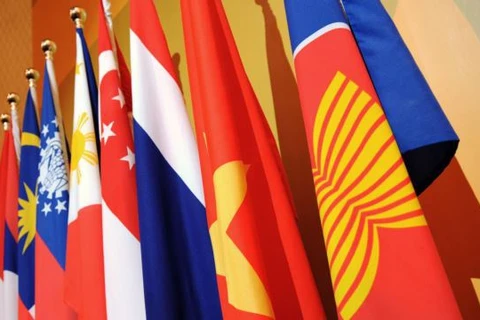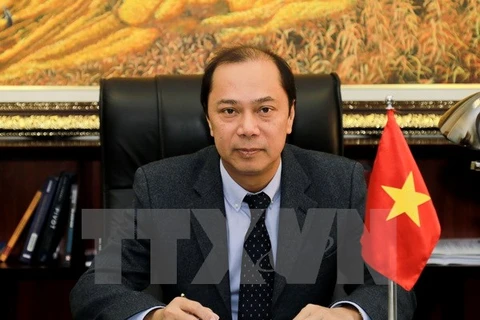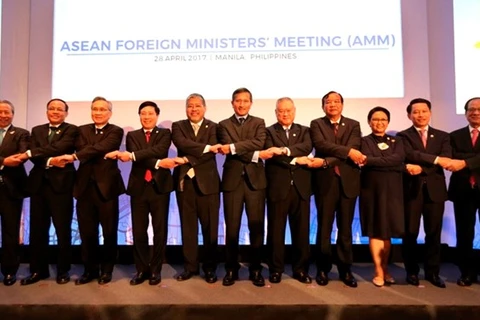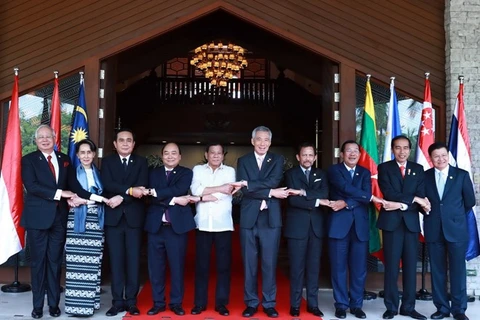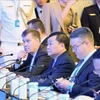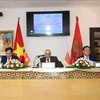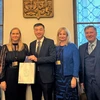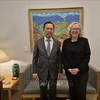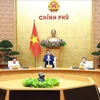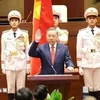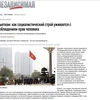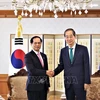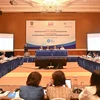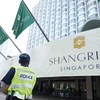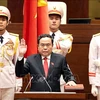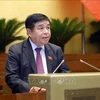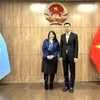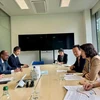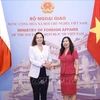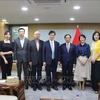Manila (VNA) – ASEAN member states need to uphold their responsibility and the community’s spirit, especially a common stance, on international and regional issues, towards increasing the bloc’s position in the international arena, said Prime Minister Nguyen Xuan Phuc at the retreat meeting in the framework of the 30th ASEAN Summit in Manila, the Philippines.
He urged ASEAN to lead the way in abiding by international law and basic principles of international relations, in line with its goal to build a rule-based community.
The Vietnamese Government leader also called for more efforts from the group to improve the effectiveness of cooperation with its partners and intra-bloc dialogue mechanisms, with a focus on result-oriented activities.
In his speech, PM Phuc shared the common concern about recent developments in the international and regional situation, which left multi-dimensional impacts on ASEAN and each member nations.
He stressed that the challenges are also an opportunity for ASEAN to prove its capacity and central role in addressing regional issues.
The PM also expressed concern about the escalation of tension in the Korean Peninsula, the East Sea, the East China Sea, and recent terrorist attacks in European countries, while applauding joint efforts of ASEAN in tackling both traditional and non-conventional security challenges.
ASEAN should promote the basic principles and common stance on solving disputes by peaceful measures in line with international law, especially the UN Convention on the Law of the Sea 1982 (UNCLOS 1982).
He call on parties to exercise restraint, not to use or threat to use force, and respect legal and diplomatic processes, while fully and strictly implementing the Declaration on the Conduct of Parties in the East Sea (DOC) and working towards an early formulation of an effective and feasible Code of Conduct in the East Sea (COC), contributing to maintaining peace, stability, security, aviation and navigation safety in the waters.
ASEAN leaders welcomed the progresses in the relations between ASEAN and its outside partners, reflected in the outcomes of the implementation of Action Plans between ASEAN and its Dialogue partners.
They noted that more regional nations and organisations wish to strengthen cooperation with ASEAN, and the bloc’s role in ASEAN-established mechanisms is valued and respected.
The leaders gave instructions on the organisation of activities celebrating important anniversaries with the bloc’s key partners, such as the 40th anniversary of cooperative relations with the US, Canada, EU, and the 25th anniversary of ASEAN – India relations. They said the celebrations are opportunities to create new impetuses for the relations between ASEAN and its partners.
The meeting underlined the importance of maintaining the central role of ASEAN in the forming regional structure, improving the efficiency of ASEAN-led regional cooperation mechanisms and forums, and enhancing the bloc’s capability in addressing global and regional issues.
Regarding regional and international situation, the ASEAN leaders expressed their concerns over the complicated developments, such as the tension related to the Korean Peninsula, militarisation activities in the East Sea, and spreading terrorism threats.
They agreed that ASEAN needs to develop a strong common voice and bring into play its role, thus contributing to the joint efforts to maintain peace, security and stability in the region and the world.
The ASEAN nations’ leaders welcomed the timely issue of the ASEAN Foreign Ministers’ Joint Statement on the bloc’s stance on the tension in the Korean Peninsula, calling on all parties concerned to exercise self-restraint in order to de-escalate the situation and resume negotiations.
They also reiterated the need to push for the completion of a framework for a Code of Conduct (COC) in the East Sea by mid-year, creating the conditions for the early formulation of an effective COC.
After the meeting, ASEAN leaders met with representatives from the ASEAN Inter-Parliamentary Assembly (AIPA), and young representatives from ASEAN member countries.
They encouraged the involvement of all walks of life to promote cooperation, sustainable growth within the bloc and to improve competitiveness for the bloc’s member states.
They emphasized the commitment that ASEAN will make more endeavour to create connection among people and Governments, thus reaching consensus and support for the intra-bloc cooperation, and promote mutual understanding among member nation’s people, towards a law-governed, people-oriented and people-centred ASEAN Community.
ASEAN leaders then signed the ASEAN Declaration on the role of the civil service as the catalyst to achieve the ASEAN Community Vision 2025.
The 30th ASEAN Summit closed with a ceremony at 16:40 pm (local time).-VNA
He urged ASEAN to lead the way in abiding by international law and basic principles of international relations, in line with its goal to build a rule-based community.
The Vietnamese Government leader also called for more efforts from the group to improve the effectiveness of cooperation with its partners and intra-bloc dialogue mechanisms, with a focus on result-oriented activities.
In his speech, PM Phuc shared the common concern about recent developments in the international and regional situation, which left multi-dimensional impacts on ASEAN and each member nations.
He stressed that the challenges are also an opportunity for ASEAN to prove its capacity and central role in addressing regional issues.
The PM also expressed concern about the escalation of tension in the Korean Peninsula, the East Sea, the East China Sea, and recent terrorist attacks in European countries, while applauding joint efforts of ASEAN in tackling both traditional and non-conventional security challenges.
ASEAN should promote the basic principles and common stance on solving disputes by peaceful measures in line with international law, especially the UN Convention on the Law of the Sea 1982 (UNCLOS 1982).
He call on parties to exercise restraint, not to use or threat to use force, and respect legal and diplomatic processes, while fully and strictly implementing the Declaration on the Conduct of Parties in the East Sea (DOC) and working towards an early formulation of an effective and feasible Code of Conduct in the East Sea (COC), contributing to maintaining peace, stability, security, aviation and navigation safety in the waters.
ASEAN leaders welcomed the progresses in the relations between ASEAN and its outside partners, reflected in the outcomes of the implementation of Action Plans between ASEAN and its Dialogue partners.
They noted that more regional nations and organisations wish to strengthen cooperation with ASEAN, and the bloc’s role in ASEAN-established mechanisms is valued and respected.
The leaders gave instructions on the organisation of activities celebrating important anniversaries with the bloc’s key partners, such as the 40th anniversary of cooperative relations with the US, Canada, EU, and the 25th anniversary of ASEAN – India relations. They said the celebrations are opportunities to create new impetuses for the relations between ASEAN and its partners.
The meeting underlined the importance of maintaining the central role of ASEAN in the forming regional structure, improving the efficiency of ASEAN-led regional cooperation mechanisms and forums, and enhancing the bloc’s capability in addressing global and regional issues.
Regarding regional and international situation, the ASEAN leaders expressed their concerns over the complicated developments, such as the tension related to the Korean Peninsula, militarisation activities in the East Sea, and spreading terrorism threats.
They agreed that ASEAN needs to develop a strong common voice and bring into play its role, thus contributing to the joint efforts to maintain peace, security and stability in the region and the world.
The ASEAN nations’ leaders welcomed the timely issue of the ASEAN Foreign Ministers’ Joint Statement on the bloc’s stance on the tension in the Korean Peninsula, calling on all parties concerned to exercise self-restraint in order to de-escalate the situation and resume negotiations.
They also reiterated the need to push for the completion of a framework for a Code of Conduct (COC) in the East Sea by mid-year, creating the conditions for the early formulation of an effective COC.
After the meeting, ASEAN leaders met with representatives from the ASEAN Inter-Parliamentary Assembly (AIPA), and young representatives from ASEAN member countries.
They encouraged the involvement of all walks of life to promote cooperation, sustainable growth within the bloc and to improve competitiveness for the bloc’s member states.
They emphasized the commitment that ASEAN will make more endeavour to create connection among people and Governments, thus reaching consensus and support for the intra-bloc cooperation, and promote mutual understanding among member nation’s people, towards a law-governed, people-oriented and people-centred ASEAN Community.
ASEAN leaders then signed the ASEAN Declaration on the role of the civil service as the catalyst to achieve the ASEAN Community Vision 2025.
The 30th ASEAN Summit closed with a ceremony at 16:40 pm (local time).-VNA
VNA


